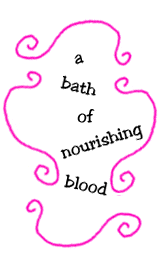 Q Dear Miss Abigail:
Q Dear Miss Abigail:
I blush easily and I hate it. In certain situations, I get so uncomfortable that my face really turns bright red. This usually happens when I get embarrassed or just when I’m with people or friends. When the teacher calls me, I blush. When someone comes up to me, I blush. This is destroying my social life. I don’t want to go out with my friends anymore, because I’ll just make a fool of myself by constantly blushing. I don’t know what to do!
Signed,
April
A Dear April:
I searched long and hard for an answer to your question, because I, too, used to be shy and blushed quite a bit. You’ll be happy to hear that I finally found this excerpt from Dr. Arthur Roth’s book titled The Teen-Age Years, which addresses your problem perfectly! Never fear, April, your blushing will disappear.
1960: Skin-Deep ~ Blushing
![]() The skin is a link between the inner workings of each person’s body and the world outside. It is made up of living tissue and therefore subject to the same natural laws and conditions as the hidden inner tissues and organs. The skin often shows results of these internal laws and conditions that otherwise could not be seen directly.
The skin is a link between the inner workings of each person’s body and the world outside. It is made up of living tissue and therefore subject to the same natural laws and conditions as the hidden inner tissues and organs. The skin often shows results of these internal laws and conditions that otherwise could not be seen directly.
A good example is blushing ~ the reddening of the skin which occurs whenever the usually tiny surface blood vessels enlarge and bring more blood to the surface than is usually there. Blushing may be part of a generalized reaction throughout most of the body. It is in this way that many organ systems are given a bath of nourishing blood so that the individual is ready to fight harder, run faster, or in some other way respond to a dangerous, frightening, or exciting situation. Of course, in most situations that arise in modern living, excitement or stimulation does not usually result in a fight or a flight for life. Nowadays internal and outward blushing is usually accompanied only by a pounding pulse, and maybe by a shy lowering of the head.
‘Why do I blush so much?’ teen-agers often ask. All people blush under certain provocations. Some feel that a blush is an unconscious admission of being too childish or having something wrong in one’s make-up. Those who are fair-skinned, or literally thin-skinned in comparison to others, become red-faced much more quickly and much more evidently than their associates. Situations that call for blushing are quite frequent during the adolescent years. Sheldon blushes when he misjudges his own size and knocks over a dish while reaching for the salt. Louise wants to be considered an adult woman, though she is fourteen. When she is successful in convincing a new acquaintance that she is really older than she is, she blushes.
Problems that were not understood at all or which were only dimly suggested during childhood become crucial for adolescents. The tendency to blush will diminish as the smoothing effects of repetition and familiarity with adult problems are experienced.![]()
Source: Roth, Arthur. The Teen-Age Years. Garden City, New York: Doubleday and Company, 1960.
~ pp. 110-11 ~